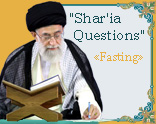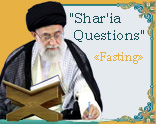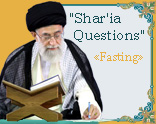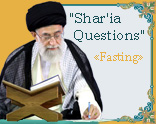Q 830: As you know, one of the following three things occurs at the beginning or
end of the each month: The crescent sets before the sunset; or the crescent sets
along with sunset; or the crescent sets after the sunset. Please clear the
following matters: First, which one of the three above-mentioned things could be
calculated for the farthest places of the world by exact electronic calculating
programs? Second, can we use theses calculations to figure out the beginning of
the month in advance, or it is necessary to sight the crescent by eye?
A: In all three cases, sighting the crescent is sufficient to ascertain the
beginning of the new lunar month from the night after the sighting.
Q 831: Is the sighting of the new crescent through binoculars, telescope, or the
like sufficient?
A: The sighting of the new crescent with these instruments is also reliable and
its ruling does not differ from that of the naked eye since the standard is to
say it has been seen by eyes. However, computerized photographing of the
crescent moon or the like which cannot be clearly categorized as sighting is
problematic.
Q 832: If the crescent marking the beginning of Shawwal is not observed in a
city by the local people but the radio or television announces the beginning of
Shawwal, should the local people act upon the radio announcement, or should they
ascertain by investigating whether Shawwal has commenced?
A: If the radio or television announcement makes them feel sure that Shawwal has
commenced, or there is a decree by the Jurist Leader announcing the beginning of
Shawwal, then there is no need for further investigation.
Q 833: If it is difficult to ascertain the beginning of the month of Ramadan, or
Eid of Fitr, because of inability to observe the crescent at the beginning of
the month due to clouds or for some other reason, and if the count of the month
of Sha‘ban or the month of Ramadan did not add up to 30 days, is it permissible
for us in Japan to go by the horizon in Iran or should we rely on the regular
calendar? What is the rule?
A: If the crescent has not been ascertained even by being sighted in an adjacent
city which is united in horizon [with your city], on the evidence of two just
witnesses, or on the basis of a decree by the religious authority, it is
obligatory to observe caution until the beginning of the month is ascertained.
Q 834: Is the unity in horizon considered to be a condition in regards to
observing the crescent?
A: Yes, it is a condition.
Q 835: What is meant by the unity in horizon?
A: When certain cities are the same concerning the possibility and the
impossibility of sighting the crescent, they are said to be united in horizon.
Q 836: If the twenty-ninth day of the month is Eid of Fitr in Tehran and
Khorasan, is it permissible for the residents of areas like Bushehr to break
their fast too, though the horizon of Tehran and Khorasan differs from the
horizon of Bushehr?
A: In general, if the horizons of two cities are so different that the new moon
cannot be seen in one of them when sighted in the other, its sighting in the
city located to the west of the other is not sufficient for the residents of the
city to the east, where certainly there is no possibility of sighting.
Q 837: If the Islamic scholars of a city differ regarding the new crescent and
one considers all of them to be just and precise in their investigations, what
is his duty?
A: If the difference between the two testimonies leads to contradiction, in the
sense that one of them claims the new crescent has been substantiated and the
other claims the opposite, one’s duty is to neglect both of them and act
according to asl. However, if the first group testifies to the sighting of the
new crescent, but the second group does not claim to have seen it, others should
accept the view of the first group — if they are just — and break their fasts.
The same rule applies when the authorized religious authority issues a decree
announcing substantiation of the new crescent.
Q 838: A person sees the new crescent and knows that the city’s religious
authority is not able to see the crescent for some reason. Is it his duty to
inform the religious authority that he has observed the crescent?
A: It is not his duty to do so unless it leads to a vile consequence.
Q 839: As you know, most Islamic scholars have written in their books on
practical laws that the beginning of Shawwal can be proved through five methods.
However, announcement of the end of Ramadan by a religious authority is not
among those methods. Thereby, how can most people break their fasts when the
beginning of Shawwal is ascertained by marji‘s? What is the duty of a person who
is not convinced of the new moon’s sighting by such means?
A: Until a religious authority issues a decree announcing the sighting of the
new crescent, the mere ascertaining of it by him is not sufficient for others to
follow him, unless they are convinced thereby of the end of Ramadan.
Q 840: If the Leader of Muslims issues a decree announcing the next day as Eid
of Fitr and the media report that the crescent has been cited in certain cities,
does it determine the Eid for all the cities or only those cities and those of
the same longitudes?
A: If the decree issued by the religious authority includes a country as a
whole, it is valid for all cities in that country.
Q 841: If on the evening of Eid of Fitr, the moon appears as a very fine
crescent having the same characteristic of the new crescent, does it mean that
the next day is the first of Shawwal and that the Eid was declared by mistake?
Is one required to perform qadaa’ for the last day of Ramadan?
A: The thinness or thickness of the moon and also its size and position in the
sky are not shar‘i evidence in deciding the first or second of a month. But if
it brings conviction to the mukallaf, he is obliged to act in accordance with
his knowledge in this case.
Q 842: Can the night of the full moon, which is the fourteenth night of the
month, be taken as a reliable basis for calculating the first day of the month
so as to determine whether the Day of Doubt was the thirtieth of Ramadan and to
apply its rule, for example, so that all who did not fast on that day may have
evidence concerning the necessity to perform qadaa’ for the thirtieth day of
Ramadan and whoever fasted that day, considering Ramadan to continue, may know
that he is free of obligation?
A: That which has been mentioned does not constitute shar‘i evidence for
anything mentioned. However, if it brings knowledge to the mukallaf his
obligation is to act in accordance with his knowledge.
Q 843: Is watching out for the new moon a kifa’ obligation or something to be
done as an obligatory caution?
A: It is not a shar‘i duty in itself.
Q 844: Are the beginning and end of Ramadan determined through sighting the
crescent or by means of the calendar, even if Sha‘ban was not thirty days?
A: Deciding the beginning of any lunar month is possible through one of the
following methods: sighting the new moon by the mukallaf himself; the testimony
of two just witnesses to that effect; numerous reports that bring conviction
that the moon has been sighted; completion of thirty days since the month’s
beginning; or the decree of a religious authority.
Q 845: If it is permissible to follow a government announcement regarding
sighting the crescent and it constitutes a scientific criterion for the new
month in other regions, is it limited to an Islamic government or does it
include a tyrannical government?
A: The criterion in this regard is being confident that the crescent is sighted
in a place where it is sufficient in relation to the mukallaf.
Q 846: Would you please tell us what your opinion is regarding i‘tikaf in
masjids (whether it is a jami‘ masjid or not) other than the Four Masjids?
A: There is no objection to doing it hoping that it is desired in shar‘.



















